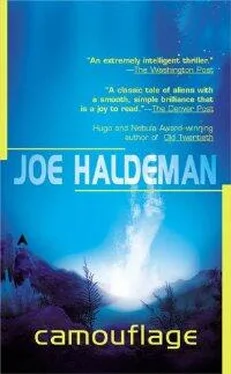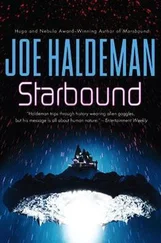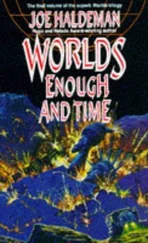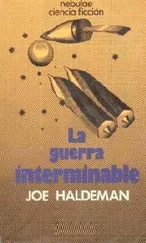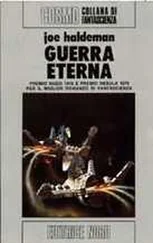“So what happens next,” Russ said, “if we get out to Jupiter and still don’t have anything?”
She shrugged. “More invasive procedures, I suppose. Jack must have ideas. He’s not committing himself.”
Russ finished off his glass but didn’t pour another. “He has more than ideas. He has an offer. From China.”
“He didn’t say anything.”
“Yeah. I only know because I was in the office when the machine decrypted it. He couldn’t tell me not to watch.”
“Let me guess. They want to bury the thing in chop suey.”
“Not even close. Chop suey’s American, anyhow.”
“I know. What is it?”
“They’ll cosponsor putting the artifact into orbit. Split the cost of a cluster of four Long March rockets.”
“And once in orbit?”
“Take the big laser up with it, I guess. Try it at a hundred percent, safely off Earth.”
She shook her head. “Remind me to be somewhere else when it’s overhead.”
“I think he can be talked out of it. It would mean taking government money.” He refilled both of their glasses. “We have to come up with something else, though.”
She stared at the containment dome. “We could just send it into the future.”
“First we build a time machine.”
“I mean one day at a time. Just put a fence around it and wait for science to catch up with it.” She took a sip, still staring. “Suspend the project for ten, fifty, a hundred years.”
“Jack would die first.”
She nodded. “As would we all.”
Washington, D.C., 1974
The chameleon decided to stay in one place and make a fortune. It had been wealthy in the past, spoils of war, but it had never been a rich capitalist, which sounded interesting.
It kept the core identity of a man who went to the office every morning, did his administrative work like a good drone, and then went home to his bachelor apartment, presumably to watch TV and read. He seemed uninterested in women, and most of his coworkers thought he was gay.
What the chameleon actually did at night was become young and gay, in both senses of the word. It dropped ten or fifteen years and pounds, which it could do in a painless second, and exchanged the office uniform for something eye-catching but tasteful. Then it either went on a date or went trolling for a new source of money.
It had three wealthy men paying regular “gifts,” for discretion as well as services rendered, and made even more per month by picking up men and robbing them after sex. If they fought, it would sometimes have to kill them, but usually the threat of exposure was enough. It preferred to leave them alive, so it could identify them months or years later for a repeat performance, with a different face and body. There was a gay “scene” in Washington in the seventies, and the chameleon moved through it like an invisible predator.
It didn’t prefer gay sex to straight; one was much like the other. It made less money as a woman, though, and as a gay prostitute it ate at better restaurants, and the other man still picked up the bill.
The seventies and eighties were good for the stock market, at least for conservative investors, and all of the money the chameleon made from sex and extortion went straight to its broker. After the first million, it became a broker itself, handling its various identities under yet another false one.
It didn’t have a plan, in the sense of ambition. It watched its various fortunes grow and shrink and grow again like a horticulturist tending a garden, fertilizing in one season and pruning in the next.
It slowly became the richest creature in the world, though the wealth was scattered among a hundred identities and a thousand accounts. It started two small wars, as experiments, and profited from both, though not as well as it did in drugs and dot-coms.
It left dot-coms a year before they tanked, but then, instead of pushing its advantage, left the money to marinate for a year or decade or two. Something would come along.
Maybe money could accomplish what research had not, finding another one like himself. Humans were no challenge to kill.
Melbourne, Australia, 1997
The changeling settled into the Gippsland campus of Monash University in 1997, and spent four years earning a double degree in marine biology and biotechnology. It enjoyed Melbourne, but often spent its free time in the water, being a subject as well as a student of marine biology, and enjoying fresher fish than any sushi chef could offer.
Its academic performance was flawless, Monash being no more difficult than Harvard or MIT, and it accepted a full scholarship to James Cook University in Queensland, where it spent four years getting its M.S. and Ph.D. in marine biology, specializing (naturally enough) in the behavior of marine animals.
It took its fresh doctorate to AIMS, the Australian Institute of Marine Science, where it began researching “wonky holes,” the fisherman’s name for muddy holes that foul trawling nets near reefs. Many kilometers offshore, they turned out to be fresh water percolating from subterranean streams—a natural process that was having an unnatural effect on the reefs, because the water carried nutrients from farms, which fed algae, attracting fish. Fishermen kept the locations of wonky holes secret, because they attracted schools of fish—an easy day’s catch was worth the occasional fouled net.
Investigating this phenomenon gave the changeling its first opportunity to see itself as a great white shark. AIMS was using underwater videocams to monitor fish populations, and one weekend the changeling went out to visit a camera site. It grabbed the bait box, used to attract smaller fish, in its powerful jaws, and crunched it flat, thrashing around in a natural reaction to the strange metallic flavor. It made for some great footage, which had gone all over the oceanographers’ world by the time the changeling had turned back into a human and returned to the lab.
“Ugly customer,” it said when it saw the tape, to predictable response: “No, it’s beautiful, can’t you see? It’s just being a shark.” Actually, it was engaging in unsharklike behavior at the time, analyzing the difference in the ocean’s flavor around the wonky holes: slightly acidic fresh water. Bad for coral in the long run, though in the short run it was like an all-you-can-eat buffet for the small creatures that fed on algae and plankton, and the larger ones that fed on them, and on up the food chain to the fisherfolk who cursed the wonky holes for mucking up their nets, but kept returning.
In the long run, though, the wonky holes were one of several interlocking factors that were destroying the offshore parts of the Great Barrier Reef, which was bad for tourism as well as fishing. The changeling made them his specialty, and being a part-time shark gave him a huge advantage over other researchers: he could smell out wonky holes in the early stages of development, before they had attracted enough fish to draw the attention of humans. So he did “productive” analysis in reverse: he found relationships between fishing patterns near the shore and the formation of wonky holes, and scientifically predicted where to find the small ones.
This eventually led to a selective reforestation program—the excess percolation of fresh water was indirectly caused by the absence of trees, which would normally store large quantities of water after a rainfall, to harmlessly evaporate back into the clouds.
By this time its identity, as James “Jimmy” Coleridge, had been well established, a Californian who had adopted Australia with enthusiasm. At twenty-seven, Jimmy was considered quite a prodigy in the small world he’d mastered. James Cook University offered “the Wonky Hole Man” a tenure-track professorship, and the changeling took it with some enthusiasm, seeing it as a good platform from which to observe the overall situation of marine science in the Pacific.
Читать дальше
